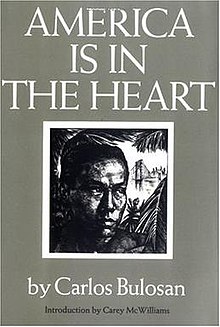America Is in the Heart

Book cover for Carlos Bulosan's America Is in the Heart.
|
|
| Author | Carlos Bulosan |
|---|---|
| Country | United States |
| Language | English |
| Genre | Autobiography |
|
Publication date
|
1946 |
| ISBN | |
America Is in the Heart, sometimes subtitled A Personal History, is a 1946 semi-autobiographical novel written by Filipino American immigrant poet, fiction writer, short story teller, and activist, Carlos Bulosan. The novel was one of the earliest published books that presented the experiences of the immigrant and working class based on an Asian American point of view and has been regarded as "[t]he premier text of the Filipino-American experience." In his introduction, journalist Carey McWilliams, who wrote a 1939 study about migrant farm labor in California (Factories in the Field), described America Is in the Heart as a “social classic” that reflected on the experiences of Filipino immigrants in America who were searching for the “promises of a better life”.
Born in 1913, Bulosan recounts his boyhood in the Philippines. The early chapters describe his life as a Filipino farmer "plowing with a carabao". Bulosan was the fourth oldest son of the family. As a young Filipino, he once lived on the farm tended by his father, while his mother was separately living in a barrio in Binalonan, Pangasinan, together with Bulosan’s brother and sister. Their hardships included pawning their land and having to sell items in order to finish the schooling of his brother Macario. He had another brother named Leon, a soldier who came back after fighting in Europe.
Bulosan's narration about his life in the Philippines was followed by his journey to the United States. He recounted how he immigrated to America in 1930. He retells the struggles, prejudice, and injustice he and other Filipinos had endured in the United States, first while in the Northwestern fisheries then later in California These included his experiences as a migrant and laborer in the rural West.
Bulosan's America Is in the Heart is one of the few books that detail the migrant workers' struggles in the United States during the 1930s through the 1940s, a time when signs like "Dogs and Filipinos not allowed" were common. The struggles included "beatings, threats, and ill health". In this book, Bulosan also narrated his attempts to establish a labor union. Bulosan's book had been compared to The Grapes of Wrath except that the main and real characters were brown-skinned. Despite the bitterness however, Bulosan reveals in the final pages of the book that because he loved America no one could ever destroy his faith in his new country. In this personal literature, Bulosan argued that despite the suffering and abuses he experienced, America was an unfinished "ideal in which everyone must invest (...) time and energy, (...) this outlook leaves us with a feeling of hope for the future instead of bitter defeat." According to Carlos P. Romulo when he was interviewed by The New York Times, Bulosan wrote America Is in the Heart with "bitterness" in his heart and blood yet with the purpose of contributing "something toward the final fulfillment of America".
...
Wikipedia
